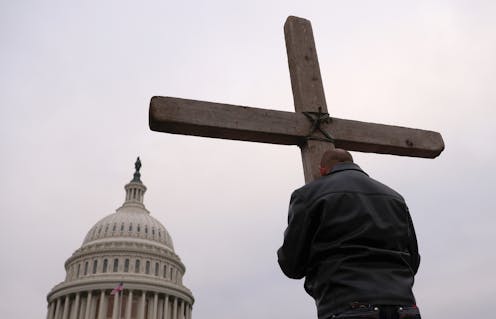signalmankenneth
Verified User
Supreme court justice Alito used a 13th-century law treatise in deciding his ruling in overturning Roe?!!
[FONT=var(--wpds-fonts-body)]Many have speculated that Samuel Alito, in his draft opinion overturning Roe v. Wade, is trying to take us back to the 1950s, when White Christian men still ruled.[/FONT]
[FONT=var(--wpds-fonts-body)]The Supreme Court justice is actually revisiting the 1250s, when the judge Henry de Bracton completed his summation of English law and custom “De Legibus et Consuetudinibus Angliae.” Alito’s opinion, after mocking the Roe decision for its “discussion of abortion in antiquity,” then provides a discussion of abortion in medieval times: “Henry de Bracton’s 13th-century treatise explained that if a person has ‘struck a pregnant woman, or has given her poison, whereby he has caused an abortion, if the foetus be already formed and animated … he commits homicide.’ ”[/FONT]
ATLANTA — In an Alabama Supreme Court decision that has rattled reproductive medicine across the country, a majority of the justices said the law was clear that frozen embryos should be considered children: “Unborn children are ‘children.’”
But the court’s chief justice, Tom Parker, drew on more than the Constitution and legal precedent to explain his determination.
“Human life cannot be wrongfully destroyed without incurring the wrath of a holy God,” he wrote in a concurring opinion that invoked the Book of Genesis and the prophet Jeremiah and quoted at length from the writings of 16th- and 17th-century theologians.
“Even before birth,” he added, “all human beings have the image of God, and their lives cannot be destroyed without effacing his glory.”
Just as the case, which centers on wrongful-death claims for frozen embryos that were destroyed in a mishap at a fertility clinic, has reverberated beyond Alabama, so has Parker’s opinion.
His theological digressions showed why he has long been revered by conservative legal groups and anti-abortion activists, and also why he has inspired apprehension among critics who regard him as guided more by religious doctrine than the law.
In a post on social media, Tony Perkins, the president of the conservative Family Research Council, described the opinion as a “beautiful defense of life and the Alabama Constitution.” But critics viewed it as dangerous and deviating from the U.S. Constitution. “Welcome to the theocracy,” wrote a columnist for The Washington Post.
https://www.yahoo.com/news/alabama-chief-justice-invoked-god-182002024.html


[FONT=var(--wpds-fonts-body)]Many have speculated that Samuel Alito, in his draft opinion overturning Roe v. Wade, is trying to take us back to the 1950s, when White Christian men still ruled.[/FONT]
[FONT=var(--wpds-fonts-body)]The Supreme Court justice is actually revisiting the 1250s, when the judge Henry de Bracton completed his summation of English law and custom “De Legibus et Consuetudinibus Angliae.” Alito’s opinion, after mocking the Roe decision for its “discussion of abortion in antiquity,” then provides a discussion of abortion in medieval times: “Henry de Bracton’s 13th-century treatise explained that if a person has ‘struck a pregnant woman, or has given her poison, whereby he has caused an abortion, if the foetus be already formed and animated … he commits homicide.’ ”[/FONT]
ATLANTA — In an Alabama Supreme Court decision that has rattled reproductive medicine across the country, a majority of the justices said the law was clear that frozen embryos should be considered children: “Unborn children are ‘children.’”
But the court’s chief justice, Tom Parker, drew on more than the Constitution and legal precedent to explain his determination.
“Human life cannot be wrongfully destroyed without incurring the wrath of a holy God,” he wrote in a concurring opinion that invoked the Book of Genesis and the prophet Jeremiah and quoted at length from the writings of 16th- and 17th-century theologians.
“Even before birth,” he added, “all human beings have the image of God, and their lives cannot be destroyed without effacing his glory.”
Just as the case, which centers on wrongful-death claims for frozen embryos that were destroyed in a mishap at a fertility clinic, has reverberated beyond Alabama, so has Parker’s opinion.
His theological digressions showed why he has long been revered by conservative legal groups and anti-abortion activists, and also why he has inspired apprehension among critics who regard him as guided more by religious doctrine than the law.
In a post on social media, Tony Perkins, the president of the conservative Family Research Council, described the opinion as a “beautiful defense of life and the Alabama Constitution.” But critics viewed it as dangerous and deviating from the U.S. Constitution. “Welcome to the theocracy,” wrote a columnist for The Washington Post.
https://www.yahoo.com/news/alabama-chief-justice-invoked-god-182002024.html

